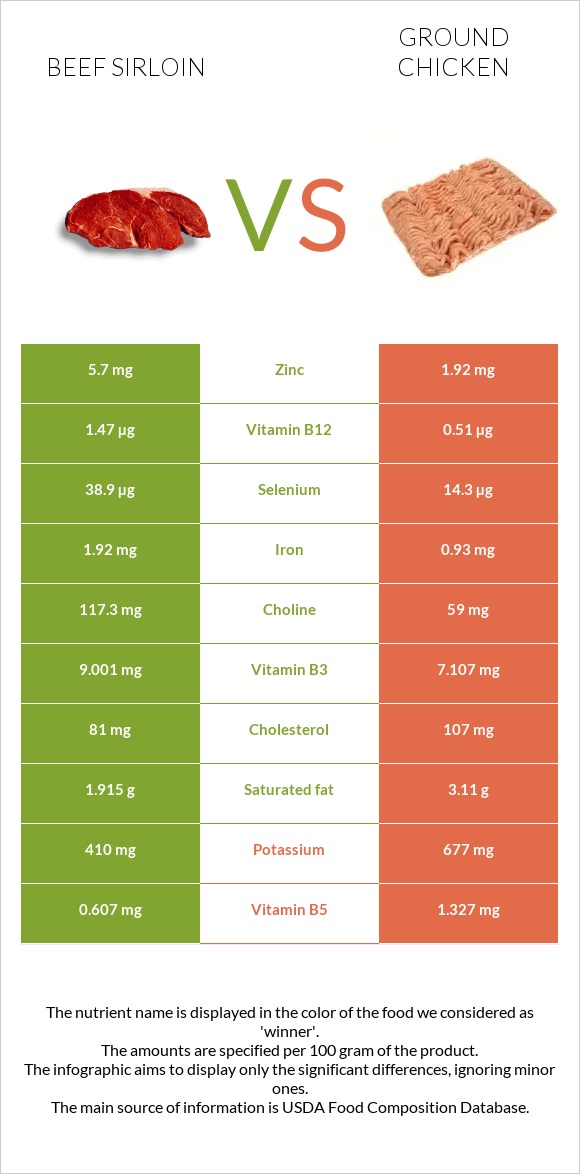Beef sirloin vs. Ground chicken — In-Depth Nutrition Comparison
Compare
How are beef sirloin and ground chicken different?
- Beef sirloin is higher in selenium, vitamin B12, zinc, iron, vitamin B3, vitamin B6, and choline; however, ground chicken is richer in vitamin B5 and vitamin B2.
- Daily need coverage for selenium for beef sirloin is 45% higher.
- Beef sirloin contains 3 times more zinc than ground chicken. While beef sirloin contains 5.7mg of zinc, ground chicken contains only 1.92mg.
- Beef sirloin has less cholesterol.
Beef, top sirloin, steak, separable lean only, trimmed to 0" fat, select, cooked, broiled and Chicken, ground, crumbles, cooked, pan-browned are the varieties used in this article.
Infographic

Infographic link
Mineral Comparison
Mineral comparison score is based on the number of minerals by which one or the other food is richer. The "coverage" charts below show how much of the daily needs can be covered by 300 grams of the food.
| Contains more CalciumCalcium | +175% |
| Contains more IronIron | +106.5% |
| Contains more CopperCopper | +37.1% |
| Contains more ZincZinc | +196.9% |
| Contains less SodiumSodium | -12% |
| Contains more SeleniumSelenium | +172% |
| Contains more PotassiumPotassium | +65.1% |
| Contains more ManganeseManganese | +45.5% |
Vitamin Comparison
Vitamin comparison score is based on the number of vitamins by which one or the other food is richer. The "coverage" charts below show how much of the daily needs can be covered by 300 grams of the food.
| Contains more Vitamin B3Vitamin B3 | +26.6% |
| Contains more Vitamin B6Vitamin B6 | +26.6% |
| Contains more Vitamin B12Vitamin B12 | +188.2% |
| Contains more FolateFolate | +400% |
| Contains more Vitamin B1Vitamin B1 | +37.5% |
| Contains more Vitamin B2Vitamin B2 | +85.3% |
| Contains more Vitamin B5Vitamin B5 | +118.6% |
| Contains more Vitamin KVitamin K | +50% |
All nutrients comparison - raw data values
| Nutrient |  |
 |
DV% diff. |
| Selenium | 38.9µg | 14.3µg | 45% |
| Vitamin B12 | 1.47µg | 0.51µg | 40% |
| Zinc | 5.7mg | 1.92mg | 34% |
| Protein | 30.8g | 23.28g | 15% |
| Vitamin B5 | 0.607mg | 1.327mg | 14% |
| Polyunsaturated fat | 0.185g | 2.08g | 13% |
| Iron | 1.92mg | 0.93mg | 12% |
| Vitamin B3 | 9.001mg | 7.107mg | 12% |
| Vitamin B2 | 0.163mg | 0.302mg | 11% |
| Vitamin B6 | 0.681mg | 0.538mg | 11% |
| Choline | 117.3mg | 59mg | 11% |
| Fats | 5.03g | 10.92g | 9% |
| Cholesterol | 81mg | 107mg | 9% |
| Potassium | 410mg | 677mg | 8% |
| Monounsaturated fat | 2.006g | 4.879g | 7% |
| Saturated fat | 1.915g | 3.11g | 5% |
| Copper | 0.085mg | 0.062mg | 3% |
| Phosphorus | 253mg | 234mg | 3% |
| Vitamin B1 | 0.088mg | 0.121mg | 3% |
| Folate | 10µg | 2µg | 2% |
| Calories | 177kcal | 189kcal | 1% |
| Calcium | 22mg | 8mg | 1% |
| Vitamin K | 1.4µg | 2.1µg | 1% |
| Magnesium | 27mg | 28mg | 0% |
| Sodium | 66mg | 75mg | 0% |
| Vitamin E | 0.39mg | 0.39mg | 0% |
| Manganese | 0.011mg | 0.016mg | 0% |
| Trans fat | 0.087g | N/A | |
| Tryptophan | 0.202mg | 0.196mg | 0% |
| Threonine | 1.23mg | 0.97mg | 0% |
| Isoleucine | 1.401mg | 1.06mg | 0% |
| Leucine | 2.45mg | 1.816mg | 0% |
| Lysine | 2.603mg | 2.014mg | 0% |
| Methionine | 0.802mg | 0.596mg | 0% |
| Phenylalanine | 1.217mg | 0.912mg | 0% |
| Valine | 1.528mg | 1.102mg | 0% |
| Histidine | 0.983mg | 0.706mg | 0% |
| Omega-3 - EPA | 0g | 0.008g | N/A |
| Omega-3 - DHA | 0g | 0.031g | N/A |
| Omega-3 - ALA | 0.081g | N/A | |
| Omega-3 - DPA | 0g | 0.016g | N/A |
| Omega-6 - Gamma-linoleic acid | 0.02g | N/A | |
| Omega-6 - Eicosadienoic acid | 0.015g | N/A | |
| Omega-6 - Linoleic acid | 1.787g | N/A |
Macronutrient Comparison
Macronutrient breakdown side-by-side comparison
Protein:
30.8 g
Fats:
5.03 g
Carbs:
0 g
Water:
63.58 g
Other:
0.59 g
Protein:
23.28 g
Fats:
10.92 g
Carbs:
0 g
Water:
64.92 g
Other:
0.88 g
| Contains more ProteinProtein | +32.3% |
| Contains more FatsFats | +117.1% |
| Contains more OtherOther | +49.2% |
~equal in
Carbs
~0g
~equal in
Water
~64.92g
Fat Type Comparison
Fat type breakdown side-by-side comparison
Saturated fat:
Sat. Fat
1.915 g
Monounsaturated fat:
Mono. Fat
2.006 g
Polyunsaturated fat:
Poly. Fat
0.185 g
Saturated fat:
Sat. Fat
3.11 g
Monounsaturated fat:
Mono. Fat
4.879 g
Polyunsaturated fat:
Poly. Fat
2.08 g
| Contains less Sat. FatSaturated fat | -38.4% |
| Contains more Mono. FatMonounsaturated fat | +143.2% |
| Contains more Poly. FatPolyunsaturated fat | +1024.3% |





